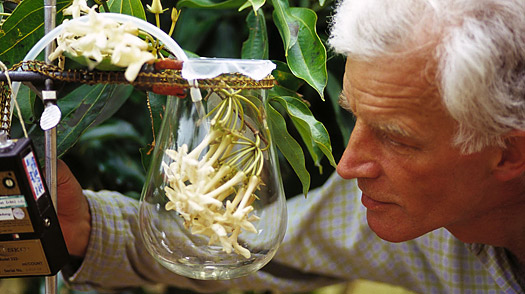
Roman Kaiser, chemist, botanist and perfumer at the Givaudan fragrances and flavors company uses headspace technology to capture the truest impression of a scent in its natural environment.
The temptation on being introduced to Jean Guichard and Antoine Lie is to look each of them in the nose. For both are perfumers, working for the world's leading fragrance company, a giant called Givaudan that holds a 25% market share of an industry with a global value of $14.6 billion.
In fact, neither the veteran, Guichard, who counts among his creations 1987's Loulou by Cacharel, which was the best-selling fragrance across Europe in 1989, nor Lie (pronounced Lee), who was trained by Guichard and went on to create the 2004 blockbuster Armani Code, demonstrates even a hint of the olfactory exuberance of a Cyrano de Bergerac. "You create perfume mentally, not with your nose," Guichard explains. "So even old perfumers who cannot smell anymore can still create very well. People who play music can understand this, as with Beethoven. You can smell mentally, like you can see mentally. If I say yellow, you can see yellow. With smell, it is exactly the same. If you say eugenol, I will get the smell of cloves."
As for Givaudan — which has its headquarters in Vernier, Switzerland, and its perfumers based in New York City and just outside Paris, in Argenteuil — its name may be unfamiliar. Yet the following fragrances, which have defined eras and endured beyond them, won't be: Fracas by Robert Piguet and L'Air du Temps by Nina Ricci, from the 1940s; Opium by Yves Saint Laurent, from the '70s; Poison by Christian -Dior, from the '80s; Angel by Thierry Mugler, from 1992; and the current best seller, Infusion d'Iris by Prada, released in 2007.
Givaudan is confident that the hits — and profits — will continue even in challenging times. Fragrance sales (along with those of cosmetics) have been the financial backbone of a fashion industry now in a downturn. And perfume is one of the rare luxuries, historically, that remain in demand even in a listless economy. While the number of new perfumes coming to -market — more than 500 in 2008 alone — is in a sharp decline, executives at Givaudan seem far from cowed by the current climate, going so far as to call it "good." Fewer launches will mean the consumer will be less overwhelmed. "Things were happening too fast," says Michael Carlos, president of the fragrance division.
More precious than speed, apparently, is the company's reach. The fragrance empire traces its origins back to 1796 and owes its size to 25 successful mergers and acquisitions. (On a more prosaic level, it is also responsible for the lemon scent of your detergent.) Even if your favorite fragrance was not created by Givaudan, it's likely there's a link. The company's 60-year-old perfume school in Argenteuil, which Guichard helms, is so renowned in the business, you could call it the olfactory equivalent of Harvard. Almost all the best "noses" are alumni, including Jacques Polge of Chanel and Jean-Claude Ellena of Hermes. Indeed, one-third of the world's fragrances have been created by perfumers trained by Givaudan. From the 200 or so applicants each year — most of whom are already working in the industry — only three or four are admitted to the grueling three-year course. They receive a salary while they study and, in return, are contracted to work for the company after graduation, although later they can go where they please. Among the alumni who have left Givaudan and later returned is Antoine Lie.
What makes a great perfumer? The gift of a good sense of smell is just the start. (And no, perfumers don't wrap their noses under scarves in the winter months, and some even smoke.) The hard work comes in developing a memory of more than 1,200 ingredients — akin to learning the Mandarin of smell — and then using this alphabet, known by heart, to conjure up the fragrance equivalents of words, then -phrases. Six months into the course, students must be able to visualize tuberose, lilac and bergamot as automatically as the rest of us can see the colors of the rainbow. They must also be able to recognize the 500 components that together give scent to a single rose. As a result of his training, Lie can even create perfume on the go, away from the lab. "When I'm traveling, if an e-mail arrives saying 'Make it more fruity,' I can look at the formulation on my laptop and see in my head what I need to add," he says.
Students also study the Dante, Shakespeare and Voltaire of fragrance, which is to say classics such as Chanel No. 5 and, above all, Fracas, which, heady with the carnal floral notes of tuberose, remains "essential to perfume's genealogy," according to Guichard. "Just as Picasso could not have existed without Van Gogh, without Fracas, there would be no Chloe, no Michael Kors, no Poison by Dior. Fracas is the mother to modern perfume."